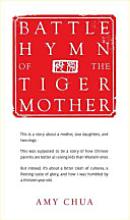All of us begin our lives as children, and we evolve into adulthood from the childhood we experienced. The choices and decisions my parents made about discipline, religion, playtime, homework, grades, lessons outside of school, summer camp–these and more–contributed to the adult I became. In my childhood, my grandparents and other older relatives were also influential in my attitudes and self-image.
My childhood laid the foundation for the career I chose as an elementary school teacher. I have been around children all of my adult life—as an educator, a parent, a step-parent, and now as a grandparent. In most ways, my life has been about guiding and teaching children and I have strong opinions about education and parenting.
A controversial book about these subjects hit the book lists this year. It is Battle Hymn of the Tiger Mother by Amy Chua. As I avidly read this book last week, I knew my personal review had to become a blog post. Amy Chua took a great risk writing a book comparing her commitment to Asian parenting vs. Western parenting (American parenting in particular). She points out all the ways in which American parents are more concerned with their children’s happiness and self-esteem than how well they learn and achieve. According to the author, being number one and at the best at everything are the parent’s goal for every child. If a parent has to insult, browbeat or otherwise compel a child to practice an instrument, review for a test or rewrite an assignment, so be it. Achievement is more important than comfort, rest or happiness. Children owe it to their parents to become the best.
First of all, let me say this book is very well written, short book. At times it is even humorous, to the point that I thought she was laughing at herself and would recant everything she said at the end. She did not do so, even though one of her daughters actually rebelled and followed her own path. Ms. Chua adopted two dogs and discovered that they were individuals and required different handling. Ultimately, training a dog to do what that breed should do was a tenet she abandoned, but this was not true for her children. I thought dog training would lead to a greater understanding of all the ways in which she was oppressing her children. Not so…
As a trained educator, experienced parent and humane person, my concern is that any helicopter parent, male or female, Asian or western, should realize that the goal of education is not to mold a child; instead, it is to enable a child. When we work with children, the obligation is to establish a foundation of basic skills, teach our children how build on those skills and help them discover their lifelong interests as self-directed, independent learners. If educators and parents pave the way, young people will link their skills and with their interests.
Children and young people need time to dream, create and think. They need time away from academics to move, dance, sing and pursue arts and sciences in their own time. If children are not allowed to make their own choices and mistakes, discover their strengths and weaknesses, they will not develop self-confidence and autonomy. The children of today are the leaders of tomorrow—we want them to become independent, self-directed learners who are also creative, open-ended thinkers. These are the skills necessary to successfully navigate the complicated future that lies ahead.


You must be logged in to post a comment.